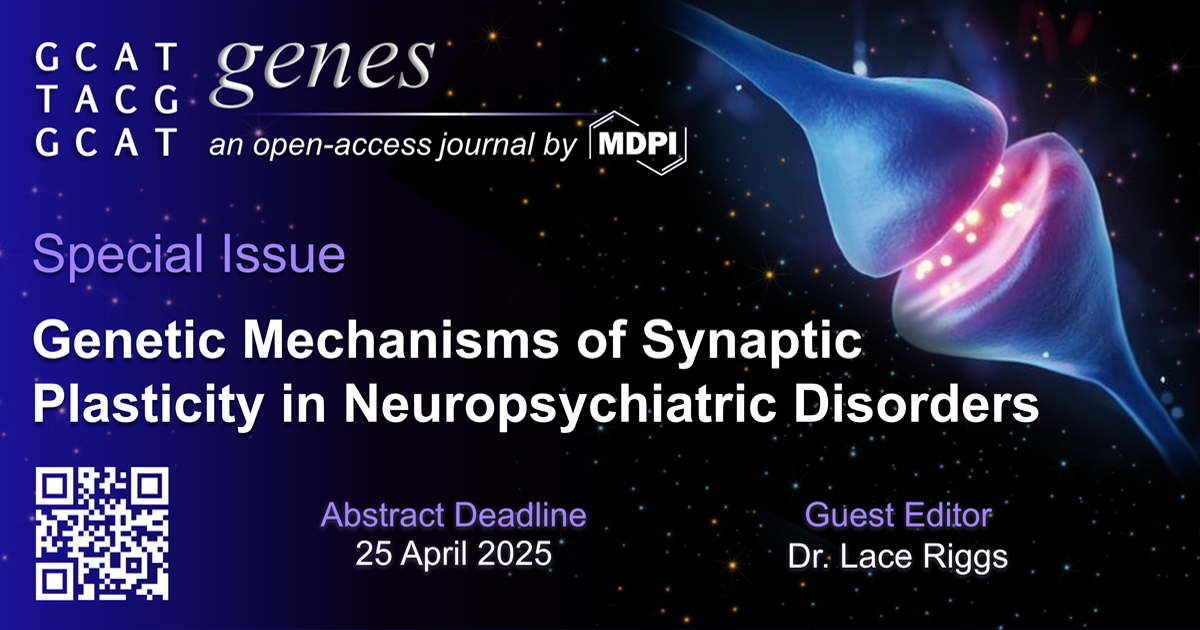Genetic Mechanisms of Synaptic Plasticity in Neuropsychiatric Disorders
A special issue of Genes (ISSN 2073-4425). This special issue belongs to the section "Human Genomics and Genetic Diseases".
Deadline for manuscript submissions: 25 April 2026 | Viewed by 224

Special Issue Editor
2. Stanley Center for Psychiatric Research, Broad Institute of MIT and Harvard, Cambridge, MA 02142, USA
Interests: synaptic plasticity; synaptic physiology; cognition; antidepressants; depression
Special Issues, Collections and Topics in MDPI journals
Special Issue Information
Dear Colleagues,
Synaptic plasticity lies at the heart of cognition, learning, and emotional regulation—and its disruption represents a shared thread across many neuropsychiatric disorders. This Special Issue of Genes invites original research and reviews that explore how genetic and epigenetic factors shape the molecular and cellular mechanisms of synaptic plasticity. We are particularly interested in studies that bridge levels of analysis—from gene discovery and molecular signaling to circuit dynamics and behavioral outcomes—in models or patient-derived systems relevant to autism, schizophrenia, depression, and related conditions. Submissions addressing emerging technologies, multi-omics approaches, and integrative frameworks that link genetic perturbations to circuit dysfunction are especially encouraged. By bringing together diverse perspectives, this Special Issue aims to advance a comprehensive understanding of how genetic mechanisms of synaptic plasticity contribute to neuropsychiatric disease and to inspire new strategies for restoring synaptic and behavioral health.
Dr. Lace Riggs
Guest Editor
Manuscript Submission Information
Manuscripts should be submitted online at www.mdpi.com by registering and logging in to this website. Once you are registered, click here to go to the submission form. Manuscripts can be submitted until the deadline. All submissions that pass pre-check are peer-reviewed. Accepted papers will be published continuously in the journal (as soon as accepted) and will be listed together on the special issue website. Research articles, review articles as well as short communications are invited. For planned papers, a title and short abstract (about 250 words) can be sent to the Editorial Office for assessment.
Submitted manuscripts should not have been published previously, nor be under consideration for publication elsewhere (except conference proceedings papers). All manuscripts are thoroughly refereed through a single-blind peer-review process. A guide for authors and other relevant information for submission of manuscripts is available on the Instructions for Authors page. Genes is an international peer-reviewed open access monthly journal published by MDPI.
Please visit the Instructions for Authors page before submitting a manuscript. The Article Processing Charge (APC) for publication in this open access journal is 2600 CHF (Swiss Francs). Submitted papers should be well formatted and use good English. Authors may use MDPI's English editing service prior to publication or during author revisions.
Keywords
- synaptic plasticity
- neuropsychiatric disorders
- autism spectrum disorder
- schizophrenia
- depression
- epigenetic regulation
- synaptic signaling
- circuit dysfunction
- gene–circuit interactions
- molecular neuroscience
- translational neurogenetics
- epigenetics
Benefits of Publishing in a Special Issue
- Ease of navigation: Grouping papers by topic helps scholars navigate broad scope journals more efficiently.
- Greater discoverability: Special Issues support the reach and impact of scientific research. Articles in Special Issues are more discoverable and cited more frequently.
- Expansion of research network: Special Issues facilitate connections among authors, fostering scientific collaborations.
- External promotion: Articles in Special Issues are often promoted through the journal's social media, increasing their visibility.
- Reprint: MDPI Books provides the opportunity to republish successful Special Issues in book format, both online and in print.
Further information on MDPI's Special Issue policies can be found here.






